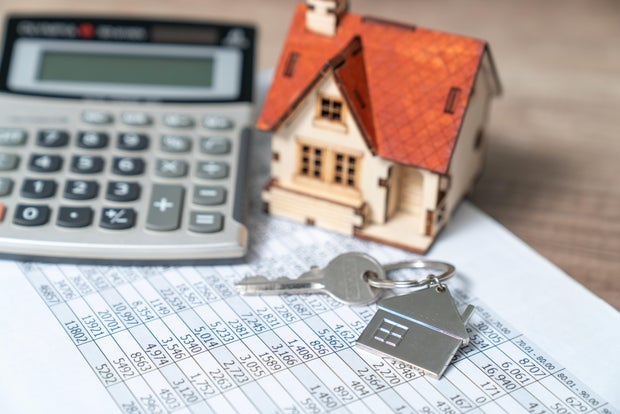You may be charged a fee from the links to the products on this page. Promotions are subject to availability and retailer requirements.

Interest is the cost you pay to borrow money. Also, although this is only part of your monthly mortgage payment, it often costs a lot over time and can affect the amount of your mortgage23} To understand how to calculate a mortgage rate is as follows: An important step in securing a mortgage.
Here's what you need to know about mortgage interest, how it's calculated and how it affects your finances.
Will the Fed's rate hike affect mortgage rate hikes?
The Federal Open Market Committee sets the short-term interest rate (federal funds rate) that banks use to borrow funds. Federal fund interest rates do not directly affect long-term interest rates such as mortgages, but the twotend to move in the same direction
The day after the FRB's recent rate hike. Mortgage rates rose to 5.78% for 30-year fixed rate mortgages and 4.81% for 15 years. Freddie Macshows that a 30-year rate hike is "the largest weekly increase in the survey since 1987" and a higher rate hike is "inflation and monetary policy flow."
You can use the free online tools on the lending market to see what mortgage ratescurrently meet
Senior Economic Analyst at Lending Tree JacobChannel,, told CBS MoneyWatch that raising interest rates could slow home sales as consumers wait for interest rates to fall. ..
"These high interest rates are a sign that borrowers have significantly weakened their desire to refinance their current loans, and demand for purchased mortgages is also declining," the channel added.
Five Factors Affecting Mortgage Interest Rates
Mortgage payments consist of two parts: principal and interest. Principal is part of your payment going directly to your balance and interest is the cost of borrowing money. Your mortgage balance and mortgage interest rate will determine your monthly payments.
Mortgage rates can vary widely from borrower to borrower. This is because mortgage lenders are based on many factors, including:
1. Credit Score:In general, the higher the credit score, the higher the mortgage rate. Lenders typically book the lowest rates for borrowers with a 740 credit score or higher.Documentfrom the mortgage giant Fannie Mae Shaw.
2. Down Payment: A large down payment means that the lender has less money on the line. Lenders usually pay a significant down payment at low interest rates. A small down payment is risky and expensive.
3. Loan Program:There are many types of mortgages, some of which have lower interest rates than others. For example, VA loans usually have the lowest interest rates, but are only available to veterans, military members, and surviving spouses. FHA loans can lower down payments and credit scores, but are only available to first-time homebuyers.
4. Loan Type:You can choose between a fixed rate mortgage or a floating rate mortgage. With floating rate loans, interest rates are initially low, but can rise over time. Fixed Rate Mortgages Interest rates are usually slightly higher for all periods, but are consistent throughout the loan period.
5. Loan Term:Mortgages come in a variety of terms, or lengths. Short-term loans tend to have lower interest rates than long-term mortgages. For example, according to Freddie Mac, the average annual interest rate for a 30-year fixed rate in 2021 was 2.96%, and the average annual interest rate for a 15-year loan was 2.27%.
The economy and each mortgage lender's expenses, risk aspirations, and capacity also play a role. (Lenders with lower overhead costs can usually offer lower rates). These factors mean that it is imperative to buy multiple lenders when applying for a mortgage. Freddie Mac estimates, and getting at least five quotes can save up to $ 3,000 in the loan process.
How to calculate interest on a mortgage
Mortgage interest is calculated on arrears. That means the month before the payment date. When applying for a mortgage, your lender should give you a repayment schedule. It accurately classifies the amount you pay principal and interest each month of your loan term.
At the start of the loan, more payment will be devoted to interest. As your term progresses, you will pay more for your principal balance.
What causes interest rates to change?
If you get a floating rate mortgage (ARM), interest rates and monthly payments may change.
For these loans, interest rates are set at an initial period of 3, 5, 7, or 10 years. When it's gone, your rate will go up and down based on the market index to which it's tied.
Floating rate mortgages usually have an interest rate cap, which limits the amount that can be raised initially, yearly, and for the entire duration of the loan. These limits can vary from lender to lender, so it is important to compare several different companies when considering floating rate mortgages.
How to determine your mortgage rate and monthly payments
To determine your mortgage rate and monthly payments, the mortgage lender will pre-determine you. You need to get approval. They withdraw your credit score and ask for more information about your finances and home purchases.
Within a few days you will receive a loan quote. This classifies loan estimates, mortgage rates, monthly payments, and other costs associated with the loan. You can use this form to compare quotes across multiple lenders and ensure you get the best deal.
Thank you for reading CBS NEWS.
Create a free account or log in to
to take advantage of other features.


